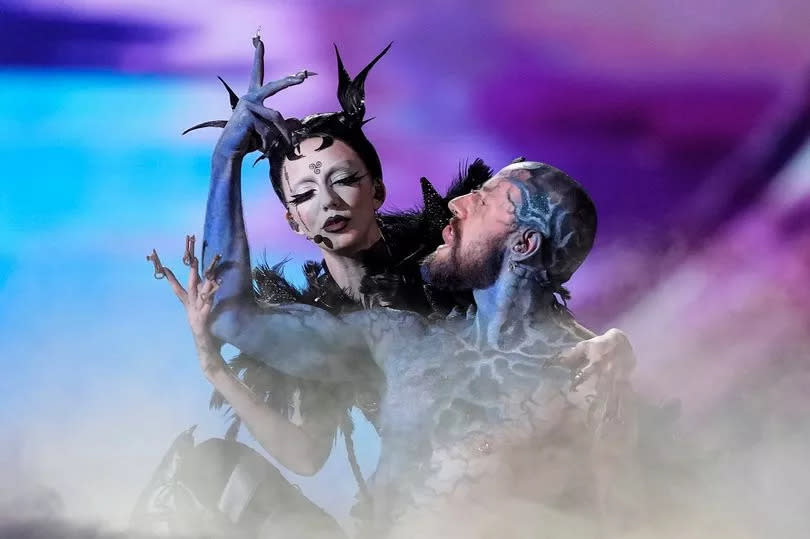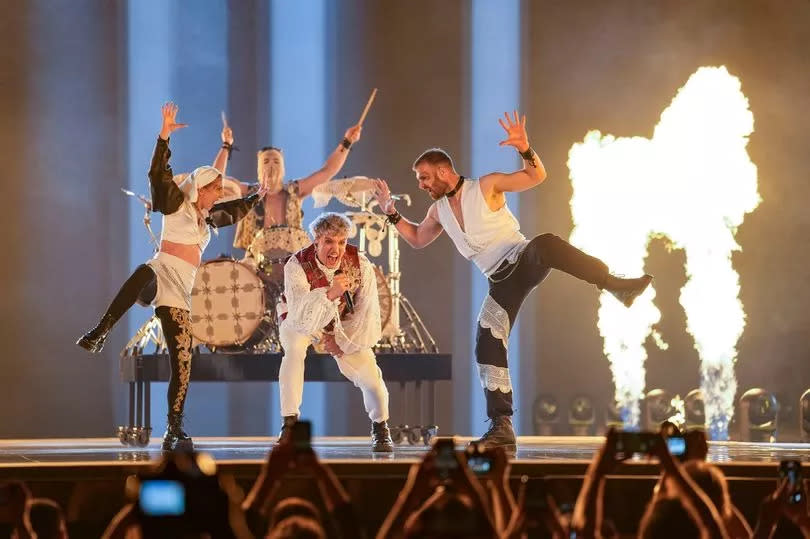Eurovision Song Contest 2024 date, time, running order, location and presenters

Outrageous costumes, melodramatic ballads, raucous rock and club-ready dance bangers - it can only be the cultural conglomeration that is Eurovision. The 2024 edition of the song contest is back on our screens with the Grand Final taking place on Saturday following two earlier semi-finals in which 11 acts were eliminated.
What better excuse to take to the sofa with friends and family and see what other nations are dishing up as their best musical endeavour for the whole world to see, hear and critique. And who will end up with the humiliating 'nul points'?
The UK has come last in Eurovision five times and hasn't won since 1997 but we can but hope we aren't left out in the cold yet again. Years & Years singer Olly Alexander will perform his dance track Dizzy on behalf of the UK this year.
READ MORE:
UK Foreign Office issues travel warning ahead of Eurovision as journeys 'may be affected'
Birmingham Pride loses £15k sponsorship as funds pulled by 'bankrupt' city council
ITV Britain's Got Talent pulls stunt performer filmed with knives after schoolboy's murder
Dame Joanna Lumley will be announcing the Eurovision Song Contest 2024 results for the UK. The Absolutely Fabulous actress, 78, will reveal what points the UK national jury gave to the other contestants during the competition's grand final. Dame Joanna follows in the footsteps of comedian and Doctor Who star Catherine Tate, Britain’s Got Talent star Amanda Holden, TV chef Nigella Lawson, comedian Mel Giedroyc and Pointless star Richard Osman.
The contest format comprises three live shows. The main rules relating to competing songs and artists are that songs must be original and no more than three minutes in length; lead vocals must be performed live; and no more than six performers can take to the stage during any performance. Here's the lowdown on when to watch and how to vote.
Where is Eurovision 2024 being held?
Following the win by Swedish act Loreen in 2023, this year's Eurovision Song Contest is in Sweden. It is taking place at the Malmo Arena in Malmo, Sweden. Malmo is the third largest city in Sweden and its arena also hosted Eurovision in 2013
The semi-finals and Grand Final are being hosted by Petra Mede and Malin Akerman.
What happened in the Eurovision 2024 semi-finals?
Ahead of the Eurovision 2024 Grand Final at the weekend, there have been two semi-finals. These were on Tuesday, May 7, and Thursday, May 9.
At the first semi-final on Tuesday, 15 countries performed. The 10 that were voted through as finalists are: Cyprus, Serbia, Lithuania, Ireland, Ukraine, Croatia, Slovenia, Finland, Portugal, and Luxembourg. The five that were eliminated were: Poland, Iceland, Moldova, Azerbaijan, and Australia.
At the second semi-final on Thursday, another 16 gave their all on stage. The 10 that were voted through as finalists are: Greece, Switzerland, Austria, Armenia, Latvia, Georgia, Estonia, Israel, Norway, and the Netherlands. The six that were eliminated were: Albania, Belgium, Czechia, Denmark, Malta, and San Marino.
At each semi-final, 10 countries are chosen to go forward to the Grand Final, meaning that 11 countries will be kicked out of the competition at this stage so this is your only chance to see those entrants perform live - UK viewers can catch up on iPlayer.
When is the Eurovision 2024 Grand Final?
The Eurovision 2024 Grand Final takes place on Saturday, May 11. We'll see a total of 26 countries perform on Saturday night.
This year, in a change from the usual procedure, the Big Five (France, Germany, Italy, Spain and UK) and host country Sweden also performed in the semi-finals as part of the show, giving us a preview of what we can expect on the big night, even though they are already pre-qualified for the Grand Final and no one can vote for them at this stage.

Who's in the Eurovision Grand Final?
The 20 finalists that are picked in the two semi-finals will be joined in the Grand Final by another six countries who go straight through - these consist of 2023 winners Sweden plus the Big Five of France, Germany, Italy, Spain and the UK, whose broadcasters make the biggest financial contribution towards the contest each year.
The Grand Final running order of performances is as follows:
Sweden
Ukraine
Germany
Luxembourg
Netherlands
Israel
Lithuania
Spain
Estonia
Ireland
Latvia
Greece
UK
Norway
Italy
Serbia
Finland
Portugal
Armenia
Cyprus
Switzerland
Slovenia
Croatia
Georgia
France
Austria
Does the running order make any difference to the results?
Statistician Charlie Mullan said: "A lot is made of the draw to determine the running order for the final. Is it best to sing later so the song is still fresh in the minds of juries, or is it more beneficial to sing early while the minds of each country's jury are fresh?
"We've analysed every position to determine how many times a winner has emerged from each and which position has the country finishing last sung from. More winners (seven) have come from singing 17th in the running order than any other position.
"Loreen was the last artist to win from 17th, when she won for Sweden in 2012 singing Euphoria. Last year, Loreen sang ninth on her way to a second Eurovision victory in Liverpool. Positions eight, nine and 14 have each produced five winners each. At the opposite end of the spectrum, positions two, 16, 25, 26 and 27 have yet to produce a winner.
"The number 13 is particularly unlucky in the history of the Eurovision Song Contest. Nine times, acts singing in this position have finished last. Malik Harris was the most recent performer to finish last when he did so for Germany in 2022 gaining just six total points. Three acts have been successful from singing 13th, which is more than can be said for singing second. Not only has a winner yet to emerge from being second on the stage, but the last-placed nation has come from this position nine times."
How to watch Eurovision 2024
In the UK, the TV schedule for Eurovision 2024 is as follows:
Eurovision 2024 Semi-Final 1 is being screened on BBC1 from 8pm to 10.20pm on Tuesday, May 7.
Eurovision 2024 Semi-Final 2 is being screened on BBC1 from 8pm to 10.10pm on Thursday, May 9.
Eurovision 2024 Grand Final is being screened on BBC1 from 8pm to 11.55pm on Saturday, May 11.
You can also watch Eurovision on BBC iPlayer and the official Eurovision YouTube channel.
How to vote in Eurovision 2024
In the Grand Final, viewers in the UK will see numbers come up on screen and will then be able to vote by phone or text message. You can also participate via the official Eurovision Song Contest app, where you get live information about the participants and will be able to rank your favourites as well as vote. After voting via the app you are sent a video message from your favourite contestant.
At the Grand Final, voting for viewers in participating countries will open just before the first song is performed and remain open until 25 to 40 minutes after the last song.

Viewers in non-participating countries - such as the USA for instance - will have nearly 24 hours to vote for their favourite songs, split across two voting windows. Online voting will open for these countries at approximately midnight Central European Summer Time (or CEST, currently an hour ahead of the UK) on the day of the Grand Final, and will initially stay open until the live show begins. Voting will then reopen just before the first song is performed until 25 to 40 minutes after the last song.
After all songs have been performed, each country will give two sets of points (1, 2, 3, 4, 5, 6, 7, 8, 10 and 12) to their favourite songs. The first set comes from a jury of five music industry professionals in each country and is then followed by points allocated after adding up all the public votes. You cannot vote for your own country.
At the end of the Grand Final, the song that has received the most points wins the iconic trophy and the winners are then brought back on stage to perform once more.
Get breaking news on BirminghamLive WhatsApp. Join our dedicated community to get the latest updates.

 Yahoo News
Yahoo News 
